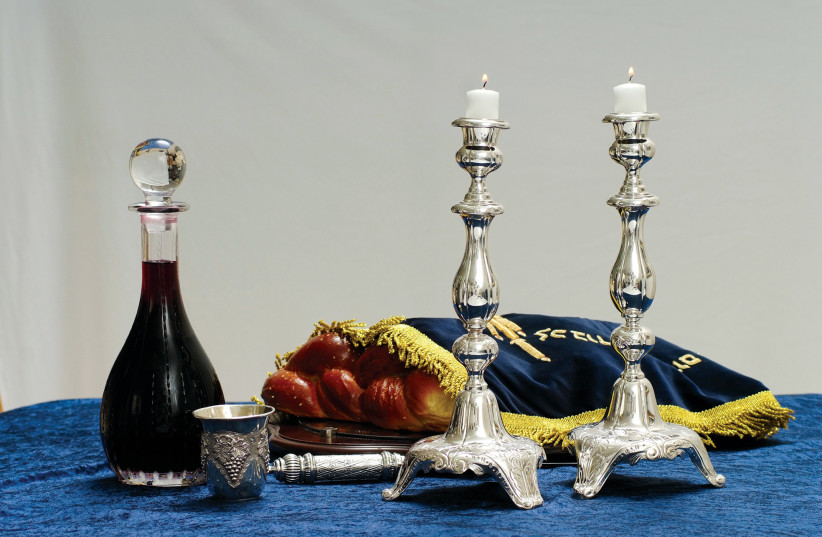Prolific cookbook writer, recipe and product developer, and Tel Aviv resident Adeena Sussman is particularly suited to bringing the essence of Shabbat to an audience beyond the traditionally observant – to those simply looking for a day of rest and relaxation accompanied by great food.
Sussman’s latest cookbook, Shabbat: Recipes and Rituals from My Table to Yours, offers recipes, ideas for entertaining on Shabbat, and explanations and tidbits for readers of all backgrounds who have one thing in common: a willingness to put in time and effort to create beautiful, freshly made breads, soups, salads, main courses, and desserts for the day of rest.
The Shabbat cookbook follows the success of her acclaimed Sababa: Fresh Sunny Flavors from My Israeli Kitchen. Sussman has authored or co-authored 15 cookbooks, including one with American model and TV personality Chrissy Teigen. Three have also been New York Times bestsellers.
Growing up in her family’s observant Palo Alto, California, home, Sussman looked forward to Shabbat each week. She would watch her working mother, Steffi, jot down menus on recycled scraps of paper throughout the week and rise early to start the Shabbat cooking process on Wednesdays.
She learned her first kitchen hack from her mother – cutting brown paper bags into makeshift parchment paper. During those years, kosher products weren’t readily available in that part of the United States, so her family would pick up kosher meat delivered to a local synagogue once a month and keep it stocked in a freezer in their garage.

In the book’s introduction, Sussman writes, “Shabbat is the North Star of my kitchen identity; after all, it’s been a central part of my whole life.” The family came together to observe Shabbat, relax, unwind, socialize, and eat. Today, no longer fully Sabbath observant, she concedes that “it took almost leaving Shabbat cooking behind to realize how much I actually needed this respite. Shabbat is a weekly opportunity to slow down, chill out, and feast along the way.”
Sussman’s personal journey and years living in Israel help inspire her recipes, which offer innovative twists on familiar Shabbat dishes, ranging from soups such as dushpara, (Uzbecki-Jewish dumpling soup), to kugels and stews (Ashkenazi cholent and cauliflower hamin), to brunch and cocktail options for secular Israelis getting together with family and friends.
She describes the Friday rituals in her childhood home, which included dressing in special Shabbat clothes, attending synagogue, and a series of pre-meal blessings. She offers tips (it is best to knead challah by hand), weaves in explanations for why there are traditionally two challot on the Shabbat table, and offers recipes for five types of challah, jachnun (rolled Yemenite Shabbat bread), and dabo (Ethiopian Shabbat bread).
Sussman intersperses her recipes with stories, as well as tributes to friends and colleagues. When introducing her jachnun recipe, she recounts how her friend Merav Tzanani Perez, “known as Tamati at the coffee shop her husband Miki named after her,” would come home from clubbing late Friday nights and be tempted by the aroma of jachnun slow-baking in the oven. Café Tamati, near Shuk HaCarmel, is just around the corner from Sussman’s home, where she loves to meet friends and hold meetings.
She introduces her Ultimate Egg Salad recipe (which can be prepared with raw or caramelized onions – “I’m firmly team caramelized,” writes Sussman) by recounting the history of egg salad as shared by her friend, the late food historian Gil Marks. She quotes him, noting that “egg salad is a Shabbat staple food” dating back to 11th-century Franco-German Jews.
WHEN SUSSMAN suggests that cooks keep “a few staples” in their kitchen, she refers to amba, harissa, tahini sauce, labneh, pomegranate molasses, preserved lemons and preserved lemon paste, schug, and za’atar spice blend. Having these staples on hand makes it easier to follow the recipes in her “Appetizers, Dips, and Salatim” chapter, which includes Moroccan Carrot Salad; Cauliflower and Green Bean Masabacha; and Lachmagine (chewy-crispy Syrian flatbreads).
The section on kugels includes recipes for Colorful Vegetable Kugel; Caramel Apple Noodle Kugel Ring; and an explanatory note about Yapchik, a potato kugel studded with beef flanken and cooked for hours in a low-temperature oven.
Following recipes for a Shabbat dinner
In preparation for a recent family Shabbat dinner, we followed a few recipes from Shabbat: Recipes and Rituals from My Table to Yours, using its beautiful photos as a guide. Shredding the two types of cabbage needed for the Crunchy Slaw with Chickpeas and Creamy Sesame Dressing was time-consuming, but the results were as colorful as the picture in the cookbook, delightfully crisp, and refreshingly tasty.
Although we substituted the pargiot (chicken thighs) with chicken breast based on our family preference, we closely followed the recipe for Baghdadi Chicken Curry with sweet and nutty rice. The spices were perfectly balanced, and the cashews and apricots added a unique and flavorful touch.
For dessert, the Apricot Tahini Shortbread Bars were subtly sweet with a robust tahini flavor. We chose apricot preserve, suggested as an alternative, over fresh apricots or plums, unavailable in Israel in the winter months. In general, we chose recipes based on the availability of ingredients and look forward to trying the Lime-Coconut Custard Pie and the Pear and Cherry Phyllo Strudel when those fruits are in season.
Sussman’s recipes require some advanced planning and a fair amount of time to prepare. The dishes are well worth the effort – creative, well balanced, and delicious.
With her new book, Sussman has made the special taste and excitement of Shabbat accessible to everyone, whatever their level of observance or lack thereof. Hosts and guests alike can look forward to many tasty and inspiring days of rest.
- SHABBAT: RECIPES AND RITUALS FROM MY TABLE TO YOURS
- By Adeena Sussman
- Penguin Random House
- 384 pages; $23
